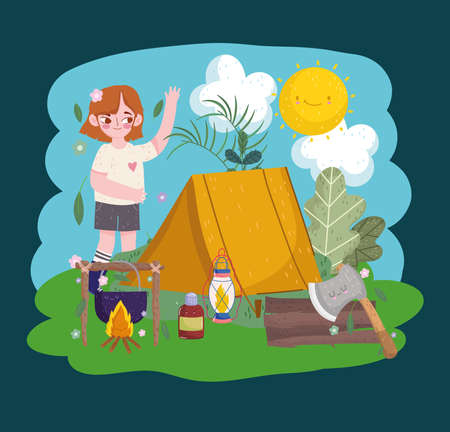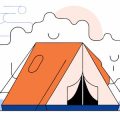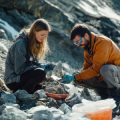1. The Appeal of Solo Mountain Camping
Solo mountain camping is becoming a big trend across the United States. More people are packing up their gear and heading out to the mountains alone, looking for something that group trips or city life just can’t offer. So, what’s behind this growing interest? It’s all about personal space, adventure, and the chance to discover more about yourself.
Why Americans Love Going Solo in the Mountains
For many, solo mountain camping is a way to escape the noise and hustle of daily life. In today’s busy world, finding true solitude is rare. A solo trip to the mountains gives you that chance to unplug—from your phone, from work emails, and from social pressures. This quiet time helps campers recharge mentally and physically.
The Top Reasons People Choose Solo Mountain Camping
| Reason | Description |
|---|---|
| Personal Space | Time alone to reflect without distractions from others. |
| Adventure | A unique sense of freedom and excitement exploring new places on your own terms. |
| Self-Discovery | Opportunities to learn about yourself, build confidence, and handle challenges independently. |
| Mental Wellness | The peace and quiet of nature help reduce stress and anxiety. |
| Connection with Nature | Experiencing the natural world up close without interruptions. |
American Perspectives on Solo Camping
In the U.S., there’s a strong tradition of valuing independence. Many solo campers say they enjoy being self-reliant—setting up camp, starting a fire, or hiking a new trail all by themselves. This isn’t just about roughing it; it’s about feeling capable and free. As more people talk openly about mental health, taking time alone in the mountains is seen as a healthy way to reset and find balance.
2. Mental Health Benefits of Solitude in Nature
Spending time alone in the mountains isn’t just about adventure—it’s also a great way to boost your mental health. When you go solo mountain camping, you give yourself space to unwind, reflect, and recharge away from the noise and stress of everyday life. Here’s how solitude in the wilderness can make a positive impact on your mind:
Reducing Stress
Life can get overwhelming, but being surrounded by nature helps calm your nerves. The peaceful sounds of wind through the trees or birds singing can lower your heart rate and help you feel more relaxed. Without constant notifications or busy schedules, your mind gets a break from all the hustle.
How Nature Helps Lower Stress
| In the City | In the Mountains |
|---|---|
| Noise from traffic and people | Quiet, calming environment |
| Constant digital distractions | No cell service, more focus on surroundings |
| Fast-paced lifestyle | Slower pace, time to breathe |
Enhancing Mindfulness
Solo camping gives you the chance to be present in every moment. Whether you’re setting up your tent, making a campfire, or just watching the sunset over a mountain ridge, you naturally pay closer attention to what’s around you. This mindfulness can help clear your head and let worries fade into the background.
Simple Ways to Practice Mindfulness While Camping
- Focus on each step as you hike along a trail.
- Listen closely to natural sounds—like rustling leaves or running water.
- Savor each bite of food while eating outdoors.
- Breathe deeply and notice how fresh mountain air feels.
Fostering Emotional Resilience
Facing challenges alone in nature—like unpredictable weather or finding your campsite—builds confidence and emotional strength. Every small victory, from starting a fire to navigating a new trail, reminds you that you’re capable of handling tough situations both in the wild and back at home.
Benefits at a Glance
| Mental Wellness Benefit | How Solo Camping Supports It |
|---|---|
| Lower Stress Levels | Less noise, fewer distractions, peaceful scenery |
| More Mindfulness | Focus on simple tasks, connect with nature’s rhythm |
| Greater Emotional Resilience | Handle challenges independently, build self-trust |
If you’re looking for a way to clear your mind and strengthen your emotional well-being, heading out for some solo time in the mountains might be just what you need.

3. Preparing for a Safe and Empowering Experience
Essential Safety Tips for Solo Mountain Camping
Heading out alone into the mountains can be incredibly rewarding, but safety always comes first. Here are some straightforward tips to keep you secure while enjoying your solo adventure:
- Tell Someone Your Plans: Always let a trusted friend or family member know your route, expected return date, and check-in times.
- Know the Weather: Mountain weather can change quickly, so check forecasts frequently and be ready for sudden changes.
- Stay on Marked Trails: Avoid wandering off established paths, especially if youre unfamiliar with the area.
- Carry Navigation Tools: Always bring a map and compass, and consider a GPS device or satellite messenger for extra peace of mind.
- Trust Your Instincts: If something feels off—weather, wildlife, or your own energy level—listen to your gut and adjust your plans.
Gear Recommendations for Diverse American Mountain Terrains
The right gear can make all the difference in the mountains. Here’s a quick overview of essentials tailored to different U.S. mountain regions:
| Region | Must-Have Gear | Why It Matters |
|---|---|---|
| Rocky Mountains | Four-season tent, thermal sleeping bag, bear spray | Unpredictable weather and wildlife encounters are common |
| Sierra Nevada | Lightweight water filter, sun protection, sturdy boots | High elevation exposure and rocky terrain require specific prep |
| Appalachians | Mosquito netting, rain gear, trekking poles | Damp forests and muddy trails demand reliable rain protection |
| Cascade Range | Waterproof clothing, crampons (in snow), navigation tools | Dense forests and potential snowfields need extra caution |
Packing List: Essentials for Solo Campers
- Tent (lightweight and easy to set up)
- Sleeping bag (rated for expected temperatures)
- First aid kit (with personal medications)
- Headlamp (plus extra batteries)
- Sufficient food and snacks (easy to prepare)
- Water bottles/hydration system (plus backup treatment method)
- Pocketknife or multitool
- Lighter/waterproof matches/fire starter
- Sunscreen and bug spray
- ID and emergency contact info card
- Trekking poles (optional but helpful for rough trails)
Mental Preparation Strategies for Going Solo
Mental readiness is just as important as physical prep. Before heading out, take some time to mentally walk through your trip:
- Visualize Your Route: Imagine each step of your journey, from setting up camp to cooking dinner alone.
- Create a Backup Plan: Know what youll do if you encounter bad weather or feel overwhelmed.
- Breathe and Reflect: Practice mindfulness or meditation before your trip to help manage any anxiety about being alone.
- Acknowledge Challenges: Its normal to feel nervous; remind yourself why you chose this adventure and focus on the positives.
4. Overcoming Challenges Unique to Solo Camping
Understanding the Common Hurdles
Solo mountain camping can be a powerful way to reconnect with yourself and nature, but it also comes with its own set of challenges. Many solo campers in the U.S. find themselves facing issues like loneliness, navigating unfamiliar trails, and confronting personal fears. Knowing what to expect and how to handle these hurdles can make your experience safer and more rewarding.
Common Challenges and How to Tackle Them
| Challenge | What You Might Feel | Practical Solutions |
|---|---|---|
| Loneliness | A sense of isolation or missing company, especially at night or during quiet moments. |
|
| Navigation Issues | Anxiety about getting lost or not finding your way back. |
|
| Confronting Fears | Nervousness about wildlife, strange sounds, or being alone after dark. |
|
Building Confidence as a Solo Camper
If youre new to solo camping, start with shorter trips closer to home before venturing deep into the mountains. This helps you build essential skills without feeling overwhelmed. Remember, every challenge is an opportunity for growth—youll return from your trip not only refreshed by nature, but also proud of what youve accomplished on your own.
5. Integrating Lessons from the Mountains into Everyday Life
Solo mountain camping isn’t just about spending time alone in nature—it’s about discovering valuable lessons that can shape our lives back home. When you step away from the constant buzz of modern American life and find quiet on a mountaintop, you gain new perspectives that can make everyday living more meaningful and less stressful. Let’s explore how these takeaways can be woven into your daily routine.
Building Resilience Through Adversity
Camping solo in the mountains teaches you to handle challenges head-on, whether it’s a sudden rainstorm or navigating tough terrain. These experiences build mental toughness and adaptability—skills that easily translate to facing work deadlines, family issues, or unexpected setbacks at home.
| Mountain Challenge | Everyday Application |
|---|---|
| Adapting to changing weather | Staying flexible when plans change at work or home |
| Navigating unfamiliar trails | Tackling new projects or situations with confidence |
| Coping with solitude | Managing loneliness or stress in daily life |
Mindfulness and Being Present
While alone in the wild, every sound and sensation becomes heightened. You become more mindful—aware of your breathing, the rustle of trees, and even your thoughts. This practice of mindfulness helps reduce anxiety and boosts focus, skills you can use during a busy day, whether you’re stuck in traffic or handling a tough conversation.
Simple Ways to Practice Mindfulness at Home:
- Take five deep breaths before starting work each morning.
- Step outside for a short walk during lunch, noticing sights and sounds.
- Turn off electronics for an hour each evening to reconnect with yourself or loved ones.
Gratitude for Simple Comforts
After relying on basic gear and simple meals in the mountains, most campers return home with a deeper appreciation for everyday comforts—a hot shower, a soft bed, fresh food. This sense of gratitude lifts your mood and helps keep minor frustrations in perspective.
| Mountain Simplicity | At-Home Appreciation |
|---|---|
| Brewed coffee over a campfire | Your morning cup from the kitchen feels extra special |
| Shelter from wind and rain | A cozy living room is more comforting than ever |
| Basic meals after hiking | Dinner with family becomes something to savor |
Setting Boundaries and Recharging Regularly
Solo trips remind us how powerful it is to disconnect—even briefly—from constant notifications and obligations. Carry this lesson forward by setting boundaries around your time: say no when you need to recharge, schedule moments of solitude, or plan digital detoxes.
- Block out “me time” on your calendar.
- Limit social media scrolling before bed.
- Pencil in mini nature breaks—even if it’s just your backyard.
The Ongoing Impact of Mountain Wisdom
By weaving these mountain lessons into daily life, you can nurture greater resilience, peace of mind, and joy—no matter where you are. Each small step helps keep that sense of solitude and well-being alive long after your boots hit the trail.


